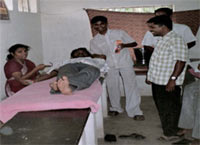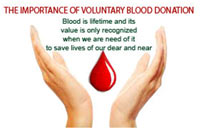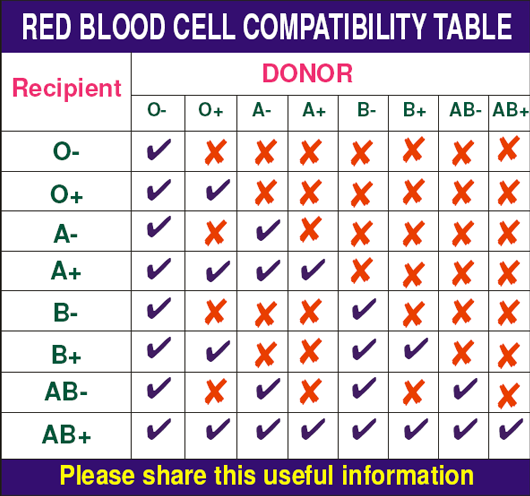Free Blood Donation
A blood donation occurs when a person voluntarily has blood drawn and used for transfusions and/or made into biopharmaceutical medications by a process called fractionation (separation of whole-blood components).Donation may be of whole-blood (WB), or of specific components directly (the latter called apheresis). Blood banks often participate in the collection process as well as the procedures that follow it. Blood donation refers to the process of collecting, testing, preparing and storing blood and blood components. Donors are most commonly unpaid volunteers, but they may also be paid by commercial enterprises. Blood registry refers to the collection and sharing of data about donated blood and ineligible donors.

Who is eligible to donate?
To give blood, you must be healthy, at least 17 years old, and weigh at least 110 pounds.
Donor Information
The most needed blood types are O+, O-, AB- and B-. These blood types are absolutely critical.If you have a donor card (i.e., know your blood type and have given before), go to the blood drives!If you have one of the critical blood types but do not have a donor card, go to the blood drives anyway!If you have given blood in the last 56 days (8 weeks), you cannot give blood again, even if you have one of the critical blood types.
Do not donate blood if you have any of these conditions
- Cold/fever in the past 1 week.
- Under treatment with antibiotics or any other medication.
- Cardiac problems, hypertension, epilepsy, diabetes (on insulin therapy), history of cancer, chronic kidney or liver disease, bleeding tendencies, venereal disease etc.
- Major surgery in the last 6 months.
- Vaccination in the last 24 hours.
- Had a miscarriage in the last 6 months or have been pregnant / lactating in the last one year.
- Had fainting attacks during last donation.
- Have regularly received treatment with blood products.
- Shared a needle to inject drugs/ have history of drug addiction.
- Had sexual relations with different partners or with a high risk individual.
- Been tested positive for antibodies to HIV.
- Malaria (within 1 year)
- Hepatitis B, C
- Any other type of Jaundice (within 16 years)
- AIDS
- Tuberculosis (within 2 years)
- Diabetes (are you under medication currently?)
- Fits/Convulsions (are you under medication currently?)
- Cancer
- Leprosy or any other infectious diseases
- Any allergies (Only if you are suffering from severe symptoms)
- Hemophilia/ Bleeding problems
- Kidney disease
- Heart disease
- Chicken Pox (within 1 year)
- Hormonal disorders
- Hemoglobin deficiency/Anemia (recently)
- Drastic weight loss (recently)
- Small Pox Vaccination (within the last 3weeks)
- Blood Donation (within the last 3 months)
- Blood Transfusion (within the last 6 months)
- Major Surgery (within the last 3 months)
- Pregnancy (within the last 6 months)
- Organ Transplant (within one year)

What are the risks and possible side effects of donating blood or blood product?
It is virtually impossible to contract a disease from donating blood. Only sterile, disposable equipment is used throughout the donation process. You cannot get AIDS or another infectious disease by donating blood or blood products. There are potential short-term side effects, however. These effects depend on the type of product being donated, your body’s tolerance to the procedure, your overall health and your previous experiences with donations. Side effects can be minimized by being well-hydrated prior to donation, eating a well balanced meal before and after donation, and getting plenty of sleep the night before. Common side effects may include dizziness, tingling in the lips and nose and chills. All of these side effects should pass shortly after donation.
Free Blood Donation Program
The Blood is the river of life and important aspect in our body. India daily estimated requirement of blood is roughly 4 million Of which only 34000 units are available. Voluntary blood donors have increased the supply of blood by 45000 units in the world. However, demand has increased by 45000 units .Where blood requirements are high, blood donation and recruitments camp was organized kancheepuram district, which paved way for new donors and also has motivated other to donate blood. Human welfare trust as been creating awareness about importance of life of people. Awareness program as conducted in all the rural and urban area or Chennai, Kancheepuram and trichy after which the Blood donors as been increased from last year through Human welfare trust This year we had 30000 donors who came forward for donating the blood .
Benefits of donating Blood
Recent researches have proved that not only is giving blood good for the patients in need, but it’s good for your own body as well. In addition to enjoying free juice and snacks after donating, there are physical benefits to being a regular donor. If you donate b lood several times a year, you are likely in better physical shape than those who do not, and you have a reduced risk for several severe diseases.

For more details Visit:
http://cdsco.nic.in/html/guideline.htm
http://www.tngovbloodbank.in/
